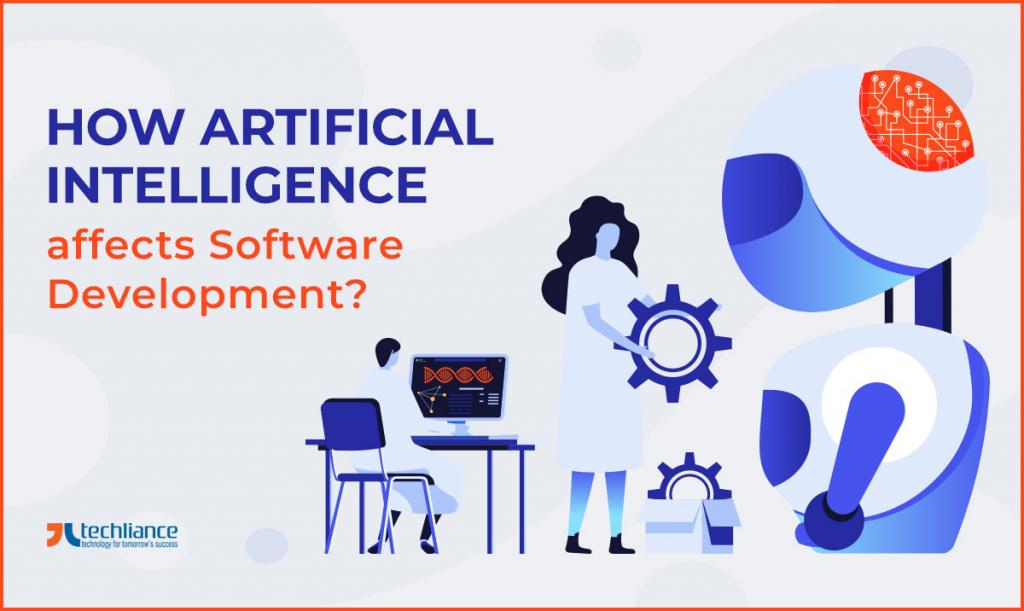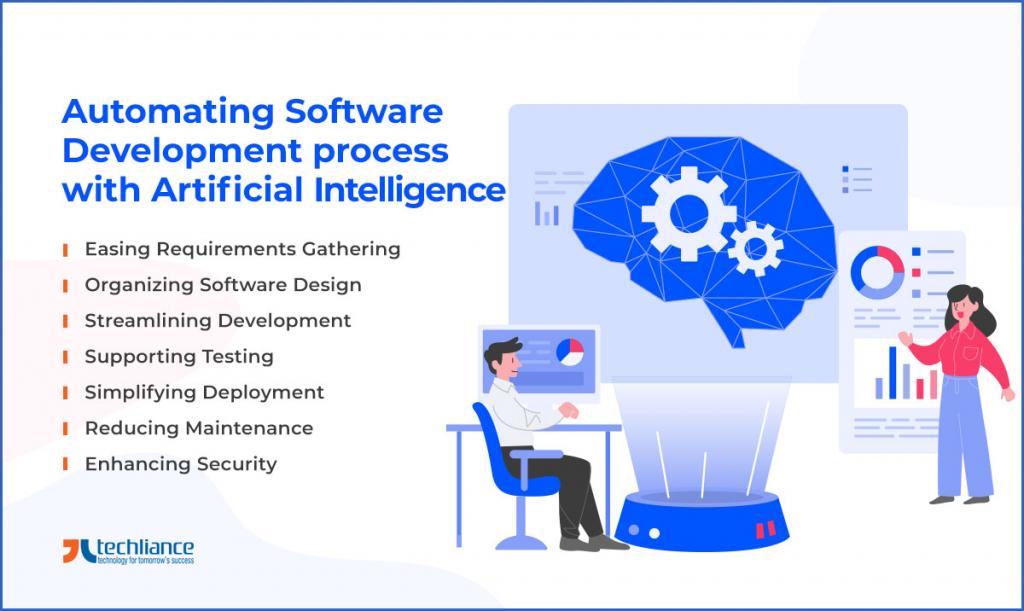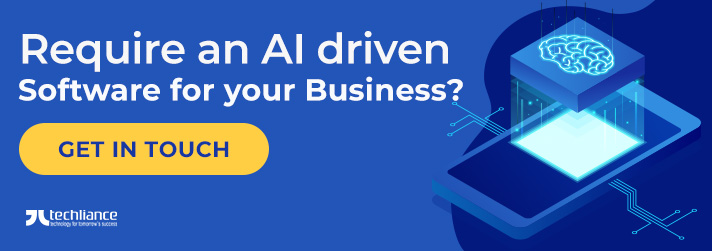Technology has changed in many ways. We see its full impact on our lives every day. Without technology and the advancement of it, it would be difficult for us to make things work out. As you can see, technology is everything. One particular example of technology that has made positive impact, is the way artificial intelligence affects software development in every aspect.
Above-all, artificial intelligence speeds up the process of creation in all these mentioned fields, particularly in software development.
When it comes to custom software development, it requires a tedious step by step process to achieve the end goal of a safe and working software or mobile app.
Software developers take a lot of time when developing software or apps.
They have to specify what they are to create, manually design it, create codes, and more.
But with AI, some processes of the software project can be shortened.
AI will continue transformation of software development practices in 2020 and coming decades.

Artificial Intelligence Statistics 2024
Given below are some cool statistics about artificial intelligence usage in software development for the decade of 2020 and near future.
- Global market size of artificial intelligence software will be USD $126.0 billion till 2025. (Tractica)
- By 2035, the present AI technology can improve productivity up to 40%, through increasing labor performance. (Accenture)
- In 2021, 80% of emerging technologies will have foundations in AI. (Gartner)
- Nearly one-half of online customers are ready to shop more frequently, when AI is involved. While one-third of consumers are willing to spend more money, when AI/chat bots are strategically used. (PointSource)
- AI-driven recommender systems like Amazon recommendation engine, recommended videos by YouTube, and Netflix’s recommended programming are now industry norm. This has helped Netflix in accomplishing 80% stream time through personalization. (Netflix)
Automating Software Development process with Artificial Intelligence
From the development of software and apps, contribution in cybersecurity field, and ultimately towards growth of a business, artificial intelligence has contributed to a lot in society.
Besides speeding up the work process, artificial intelligence affects software development in all matters.
This article covers the positive impact of AI on software development life cycle in detail.
- Easing Requirements Gathering
- Organizing Software Design
- Streamlining Development
- Supporting Testing
- Simplifying Deployment
- Reducing Maintenance
- Enhancing Security

Let’s discuss these ways in depth, where artificial intelligence affects software development.
Easing Requirements Gathering
Requirements Gathering is a vital part of the software programming procedure, and is the starting point of a software project.
It defines the project, by containing the list of requirements such as functional, system, technical, design, and more.
All these lists of requirements are gathered from stakeholders (customers, users, vendors, IT staff, and others) to kick-start the project.
When creating requirements, it must be defined properly, if not, it may cause problems during the development process.
So, how can AI contribute to or affect requirement gathering in software development?
Requirement gathering needs the maximum intervention of humans, but AI can still offer help in this stage of development.
Tools like Google ML Kit and Infosys Nia can be used to automate some processes in gathering requirements.
It doesn’t totally eliminate human intervention in this stage of development.
The integration of AI in this stage can identify loopholes early in the process before starting the designing stage.
With the combined force of humans and AI, it would make the first life cycle of software development smooth and easy.
Organizing Software Design
Another stage in software development that artificial intelligence can play a role in is software design.
The design process requires time and thorough concentration.
In the design phase, there are aspects that need proper consideration.
It includes the architecture, user interface, platforms, programming, communications, and security.
Developers take into consideration the programming language to be used, overall design, ways how customers can interact, the security of the app, and it also includes prototyping.
All of these are being planned during the design procedure.
Here’s how AI can help during the design process.
AI can automate some complex procedures.
It reduces the number of time that designers will put on designing successful software or app.
One example of AI-integrated technology that developers can use is artificial intelligence design assistant (AIDA).
It helps designers and developers understand what their clients need and allows them to focus on that prototype.
Therefore, it displays the design that your clients want.
It eliminates the need to redesign your software when presented to the client; hence, saving you more time to develop the software or mobile app.
Streamlining Development
When done with the design process, it is time to turn the design into reality by using codes.
It will take some time when working on coding an application or program.
This is to make sure that the developers don’t have to spend time going back and forth, when creating an app or software.
Aside from making sure the codes taking up more time, it is also important to ensure that they are correct as well.
Automatic code generation (ACG) in the coding phase of software development assists developers.
It creates a concise solution and will improve productivity.
But despite the aid of AI, human involvement is still crucial when coding.
Supporting Testing
When the development stage is done, software or apps requires testing.
It is a vital part of every software development procedure.
Software developers need to test their software as for the following reasons:
- Testing points out any errors or bugs during the development phase.
- It ensures that the customers trust the organization and remain satisfied with the software or app.
- Testing helps gain confidence from customers because of the quality of the product.
- It determines the performance of the software.
- Testing avoids future failures and extra expenses.
- It keeps the business going.
But testing repeatedly, when you change codes, can be time-consuming and very costly.
Therefore, developers must be meticulous when coding.
However, software developers cannot create codes perfectly all the time.
That’s when AI comes to the rescue.
Leveraging the artificial intelligence (AI) to test cases, and performing regression testing, can be helpful in creating error-free software.
For example, you can use AI testing platforms like TestCraft, Appvance, Functionize, Testim, Selenium and more to properly analyze your software.
Simplifying Deployment
AI can influence the deployment phase of software development like other stages of its life cycle.
With the use of such technology, it can increase efficiency during this stage of software development.
Developers upgrades programs or apps into their newer version in the deployment phase.
It’s vital to execute this stage well, or it could ruin the software developed.
Now, how can AI play a part in the deployment process?
Artificial intelligence assists developers, by avoiding vulnerabilities when upgrading, and reducing the risk of failure, during the deployment stage.
AI uses machine learning algorithms to analyze the deployment process.
Reducing Maintenance
Good design and proper development decrease the requirement for testing, and in result, minimize the need for maintenance effort.
Testing and maintenance cost more than the development phase.
Consequently, developers can avoid these issues by integrating AI while coding, to reduce problems or errors.
Therefore, the bug free code will ensure that software is lifelong and remains evergreen.
Henceforth, proper functioning software and long-lasting experience means less maintenance.
Enhancing Security
Safety in software development is a crucial property.
Occasionally, software developers overlook security in the course of action.
But when AI is part of the development process, it can investigate any irregularities or unusual behaviors in the system.
Furthermore, it eliminates the false notifications or alerts and gets immediate warnings.

Conclusion
Artificial intelligence affects software development by playing an important role in all SDLC stages.
AI may not completely replace humans, but its presence can contribute to a successful software project.
Artificial intelligence also has some limits.
But with the combined work of humans and AI, it is possible to eliminate errors in design and development, boost productivity, lessen cost for testing and maintenance of application, and even improve security.
Usage of artificial intelligence in software development is a game-changer.
There is no denying that software developers can gain great outcomes with AI than working traditionally.
In the future, software development will get more help from AI, as it will advance and improve than now.
Do you need an AI driven Software to boost your business?
Join hands with Techliance for creating an intelligent system now.




